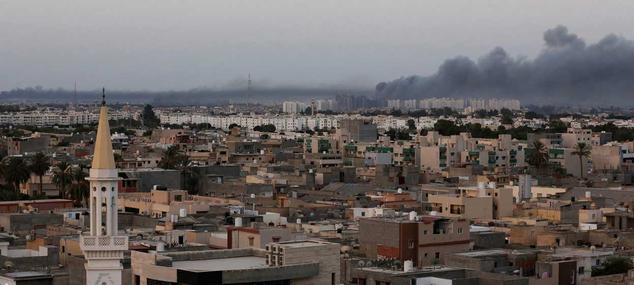Libya and Syria are currently two of the most violent hot spots in the Middle East. As leaders in Western capitals re-launch military campaigns in the region, it is important to look back on policy decisions over the past few years and explore how heeding public opinion among those affected could have led to more effective policies in both Libya and Syria.
Libyans Saw Chaos Approaching and Asked for Help
After Libyans faced off against one of the worst autocratic regimes in the 21st century, the country has fallen into chaos with competing militias vying for control. Libya is now dealing with the predictable outcome of air campaigns that are not followed up with assistance and institutional capacity building. Yet, what may be even more disappointing is that, as far back as 2012 before the Benghazi attacks, Libyans wanted this type of help, particularly the kind that could have saved their country from the chaos it now faces.
After ousting Gadhafi, Libyans wanted the country to build up a professional army. They were asking global partners to help as NATO nations virtually ignored them or lacked the bandwidth to muster a coherent policy. Today, the turmoil engulfing Libya and spilling across its eastern and western borders will only further destabilize North Africa. In fact, some countries in the region have engaged in the fight in Libya without coordinating with the U.S. or NATO. This is a recipe for disaster, as it risks further politicizing intra-Libyan conflicts as well as pursuing military "solutions" that only focus on religious extremism at the expense of also dealing with Libya's real federalism challenges.
Syrians Not Interested in Sharia-Only Legislation
Syrians in 2010 had the least interest among all populations in Arab states surveyed in a Sharia-only based legislation system. At the time, I doubt most Syrians or Arabs imagined that what ISIS is doing could, in any way, be called Sharia or associated with the concept of an Islamic state. Most at the time likely thought of their nearby neighbors in Iran or Saudi Arabia when the concept of a Sharia-based legislative system was presented to them.
It is paradoxical that we now see millions in the western and northern regions of the country living under a brand of Sharia that is not only extreme, but has been deemed wholly un-Islamic by every major Muslim institution globally. ISIS ideology and judicial practices (if they can be called that) have had tragic outcomes for human rights generally and the rights of women and religious minorities in particular. Yet Syrians in 2009 were among the most accepting of equal rights for women when compared with their Arab peers.
Clearly, coercion has been a major factor in ISIS and similar groups controlling neighborhoods and cities across both Syria and northern and eastern Iraq. Yet, at the same time, the carnage and sectarian vitriol of the ongoing civil war has certainly changed Syrian society and ripped at its soul. As with Libya, one must wonder what kind of Syria will emerge from the current crises, and whether developed countries that encouraged both Libyans and Syrians to oppose and then resist their respective governments could have practiced policies that would have mitigated the damage.



